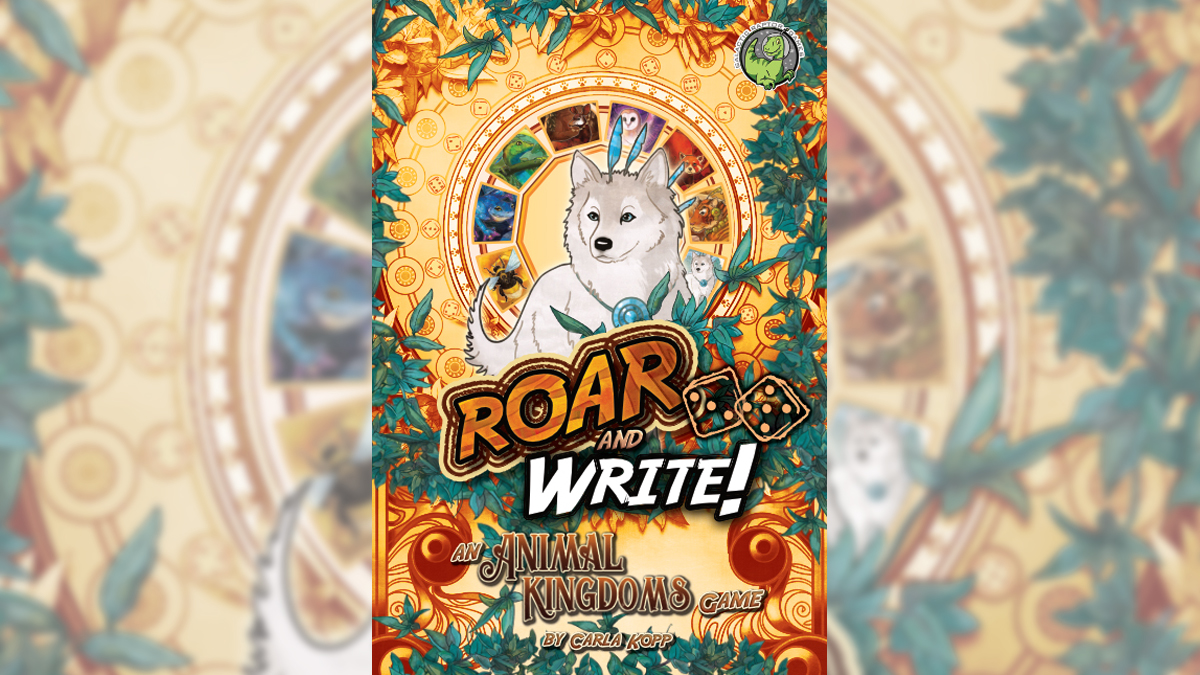The Animal Kingdoms are selecting a new ruler. Can you make the best offerings to satisfy the picky members of the Selection Council?
What Is Roar and Write!?
Roar and Write! is a roll-and-write game for 1 to 99 players, ages 8 and up, and takes about 20 minutes to play. It’s currently seeking funding on Kickstarter, with a pledge level of $19 for a copy of the game. The game uses some press-your-luck elements and has a family-friendly theme; I think the 8+ age recommendation seems about right.
Roar and Write! was designed by Carla Kopp and published by Galactic Raptor Games, with illustrations by Katy Grierson. It’s based on Animal Kingdoms (also from Galactic Raptor Games) and shares some of the same artwork but is a stand-alone game with its own rules and gameplay.
New to Kickstarter? Check out our crowdfunding primer.

Roar and Write! Components
Note: My review is based on a prototype copy, so it is subject to change and may not reflect final component quality. Stretch goals during the campaign may also affect or add to the component list. One note: the personal agenda cards (seen in some of my photos) will not actually be separate cards in the final game, but will instead be printed on the backs of the scoresheets.
Here’s what comes in the game:
- 1 Scorepad
- 12 Council Member cards
- 6 dice
The scorepad, of course, is the key component of the game: it’s where you’ll write down various dice values, hoping to complete sections so that you can score points. I’ll explain more about the various sections in the “How to Play” section. The top half of the scorepad looks a bit like the Animal Kingdoms board (and is, in fact, called the “kingdoms” section), and the bottom half is just a grid—not quite as exciting to look at, but it’s where a lot of the action happens.
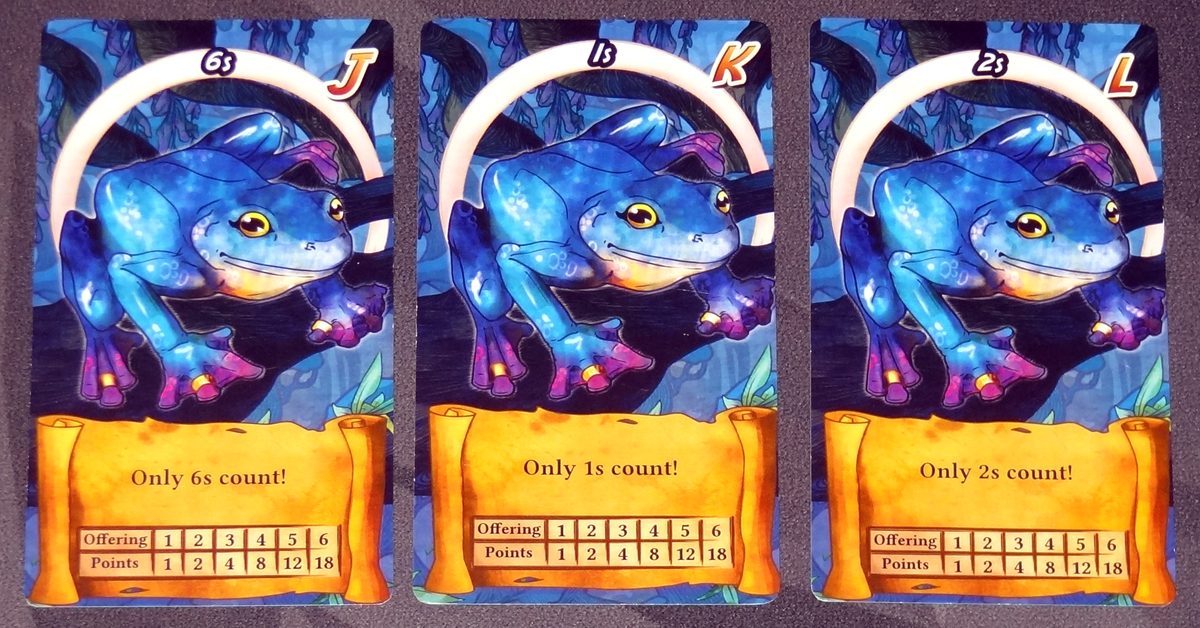
The council member cards are tarot-sized cards, with illustrations of the various animals (red panda, okapi, tree frog, and more) along with their requirements for scoring. Each of the cards is double-sided, with two different animals, allowing for various randomized setups.
How to Play Roar and Write!
You can download a draft of the rulebook here. It’s also available to try out on Tabletop Simulator.
The Goal
The goal of the game is to become the next ruler of the Animal Kingdoms by appeasing the various council members with offerings. (In other words, score the most prestige points after 5 ages!)

Setup
Give each player a score sheet and a writing utensil. Lay out five council member cards in the center of the play area. The animals chosen depend on the difficulty level, but you will always use a combination of five different animals. (There are multiple versions of each animal, so they may not always require the same offerings.)

Each player has a personal agenda. These were on cards in the prototype but will be printed on the backs of the scoresheets in the final game. Each personal agenda has a particular die value that will be worth points if written in the council offerings section, as well as a particular pair of values (like “3 & 5”) that will be worth points for each set of those two numbers in the council offerings section.
Gameplay
The game takes place over 5 ages, and each age will involve 3 dice rolls that are used by all of the players. Each player’s choices are independent, so everyone may assign the dice to their scoresheets however they wish.
Choose a player to roll all 6 dice so that everyone can see them.
Each player must now decide where to assign the die values. Each die may only be used once per player.
You may choose any number of the dice to write into your council offerings area for the current age. There are 6 spaces available per age, and you want to choose numbers that will satisfy one of the council members.
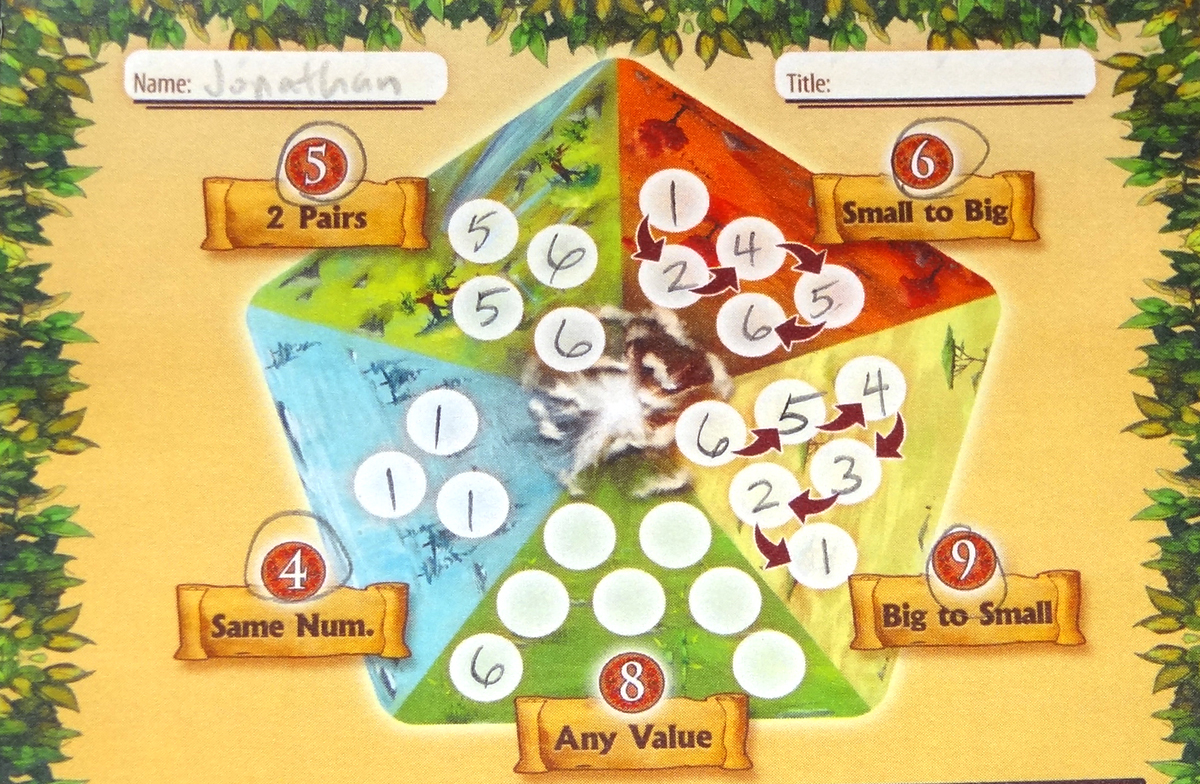
You may also choose up to 1 die per roll (that you haven’t used in your council offerings) to write into your kingdom section at the top of your sheet. Each section has rules on what can be used there: two pairs, lowest to highest, and so on. You may write additional unused dice values into the kingdom section, but for each one beyond the first, you must write an “X” in a council offerings space for this age. Once your council offerings for the age are filled (either with numbers or Xs), you may only take 1 value for the kingdom section and may not take any additional from that roll. If you fill in an entire section, circle the large point value for that section.
If you fill in all 6 spaces of the council offerings for the age, circle the early appeasement bonus depending on whether you completed it during the first, second, or third roll. The earlier you complete the offering, the more points you get.
Once everyone is ready, roll all of the dice again and repeat until there have been three rolls for the age.
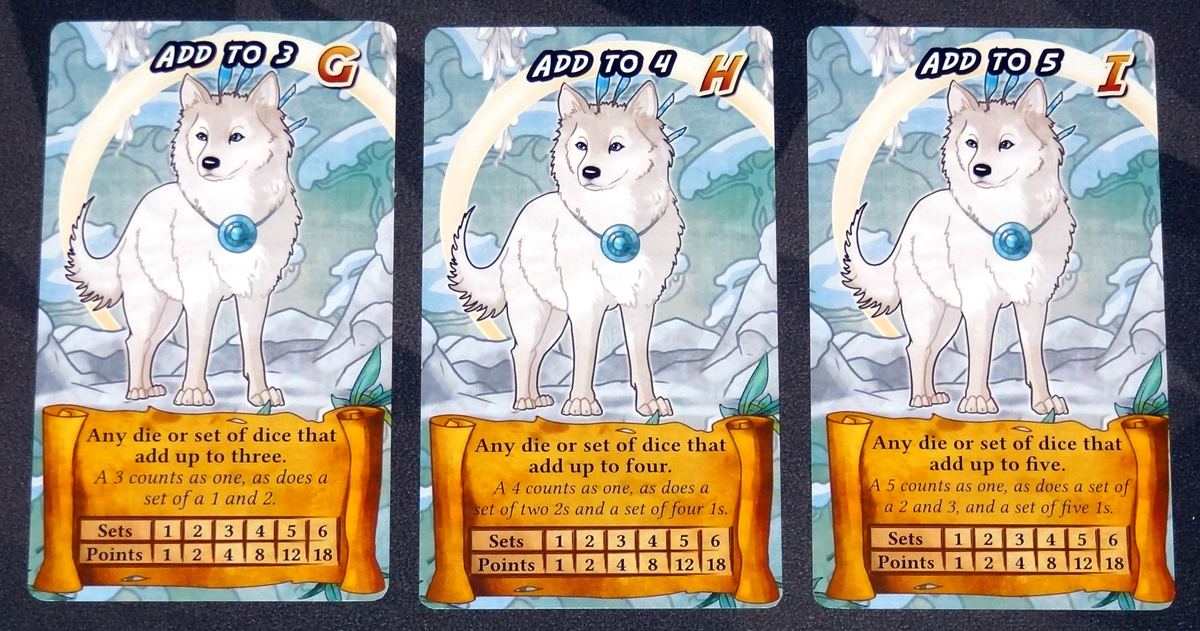
At the end of the age, choose which of the council members you will make your offering to. Each council member has different criteria, such as “four of a kind” or “all odd numbers” or “sets that add up to 7,” along with a scoring chart depending on how well you fulfilled the criteria. Write your chosen council member’s letter in the “Representative Letter” column, and then write your score next to it. The last column has room for your points earned for the age (including the early appeasement bonus) and a running total. Any number of players may choose the same council member, and you may choose a council member you have already made an offering to in a previous age. (However, there will be bonus points for making offerings to more council members.)
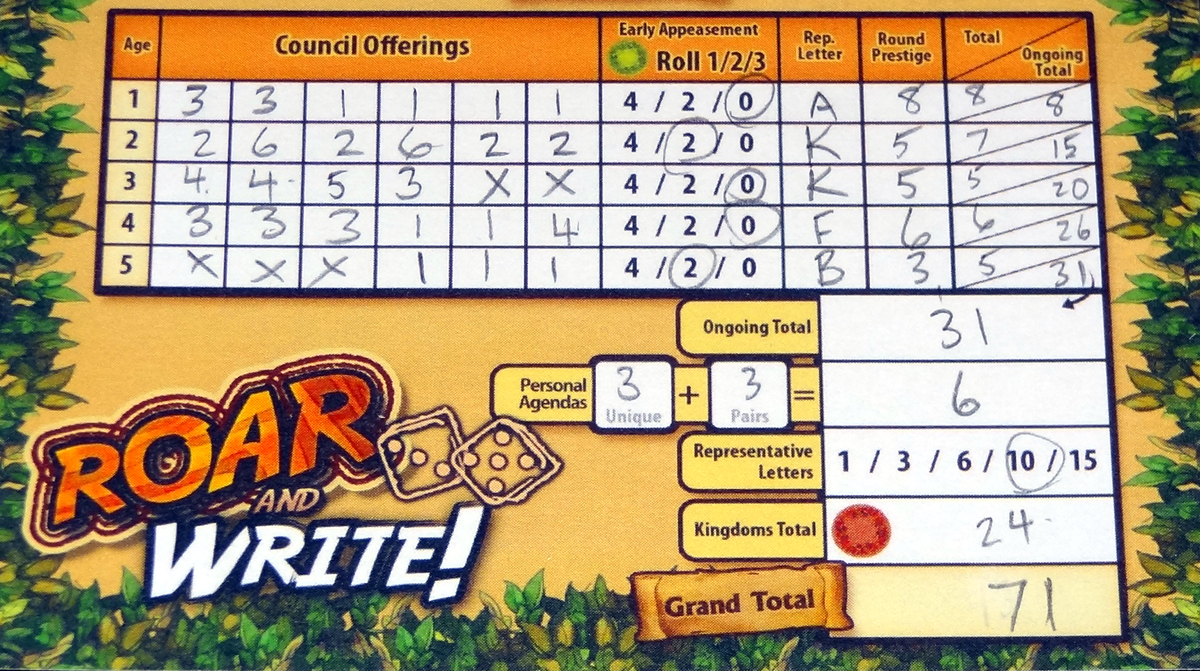
Play through all five ages in the same manner.
Game End
The game ends after the fifth age. Players total up their scores:
- Council offerings total
- Personal agenda score: score points for a particular die value and a particular pair, based on your hidden agenda
- Representative letters: score points based on how many different council members you made offerings to
- Kingdom total: add up your score for all of your completed kingdom sections
The highest score wins, and that player becomes the new ruler of the Animal Kingdoms!
Solo Game
The solo game is the same, and you simply compare your score to the score chart to find out what your new title is, from “Exiled” all the way up to “Monarch.”

Why You Should Play Roar and Write!
I have not played Animal Kingdoms myself, so I can’t compare the gameplay experience, but I know that it does involve playing cards to place your animals into a five-section kingdom board, and each section has some criteria about what cards can be played there. Roar and Write! takes that basic concept but turns it into a roll-and-write, and the council offerings section of the scoresheet also means that there’s a bit more press-your-luck involved as well.
First off: Roar and Write! is a bit more of a solitaire game, in that your actions are entirely independent of the other players. You’re each essentially playing your own game using the same set of inputs, hoping to get the best output, but nothing you do has any affect on your opponents’ score. That’s both the strength and the weakness of many roll-and-writes: if you like being able to build your own kingdom without pesky interference, then it’s a strength, but if you really want some head-to-head interaction, it’s a weakness.
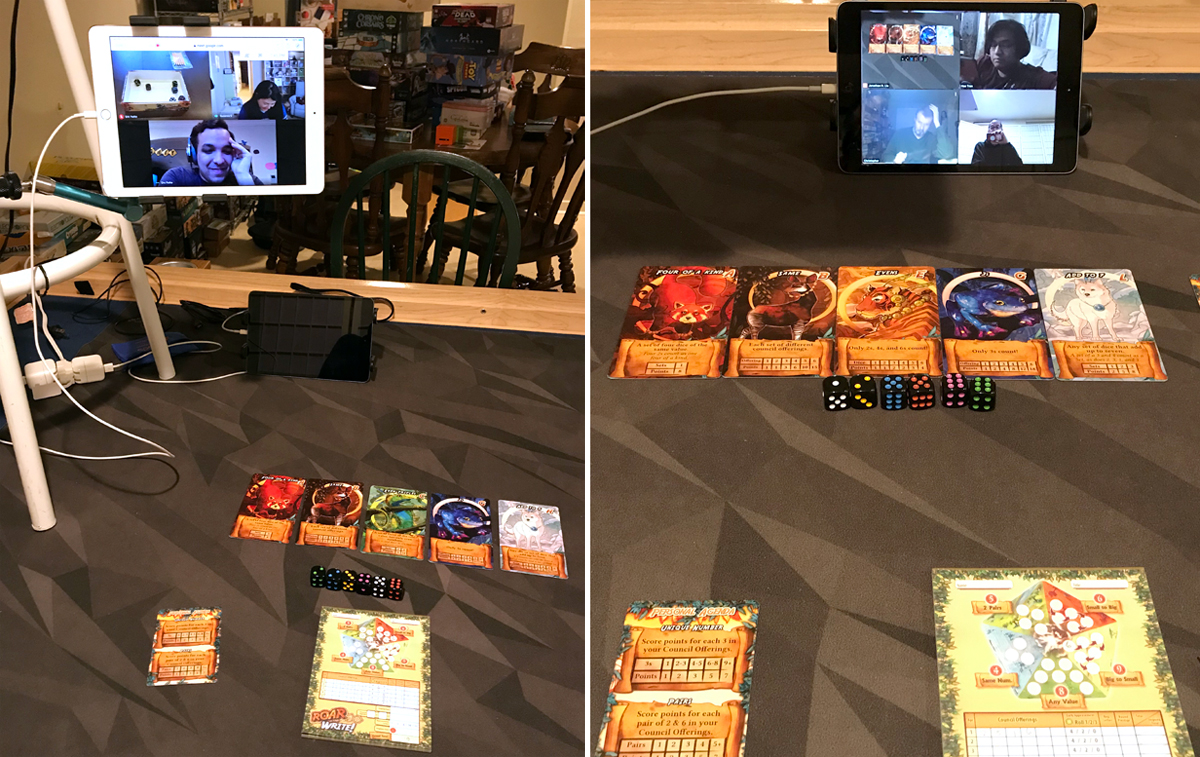
One distinct advantage, though, to the somewhat solitaire nature of some roll-and-writes, is that during this period of social distancing, this is the type of game that you can play remotely over video. It’s particularly good if everyone has a copy of the game, because they can replicate the council member cards and all you have to do is share the dice rolls with each other. (In theory, you could even do this with just an audio call—or text messaging!) Otherwise, you’ll need a way for each player to have a score sheet, but one person can share the current council member setup. Those scoring charts can be a little hard to see depending on your video quality, but whoever has the setup can provide clarification as needed.
Since each age includes three dice rolls, it forces you to decide whether to score for what you’ve got, or try to wait it out for something better. Early appeasement bonuses (filling out the council offerings) are best when you fill out the whole council offerings row on the first roll—but is that 4 points worth getting a suboptimal score for the offering itself? If you wait for the next two rolls and you never get the numbers you need, you’ll regret not taking the 4 points when you had the chance.
Also, you’ll only get 15 “free” values to put into the kingdom section, since you can use 1 value from each roll. If you want more, you’ll have to fill up offering spaces, trading points there for potentially bigger scores from kingdoms. There are 25 spaces in the kingdom, so if you want the full score there, that means putting in 10 Xs somewhere in your council offerings. Is it worth it?

And don’t forget about your personal agenda, or the bonus for making offerings to many different council members! That will affect which numbers you want to use for offerings vs. the kingdom sections. You might be able to max out the score for the same council member multiple times, but you have to keep in mind that you’re losing the representative bonus.
It’s a nice mix of different scoring opportunities, and forces you to make some tough decisions that can turn out to be horrible mistakes or brilliant tactics, depending on how the dice turn out. You may have an overall strategy in mind when you start, but the dice force you to change your approach. I don’t always like a lot of random luck in games (and the way that bad luck can be quite punishing), but for this genre—a quick-playing press-your-luck game—I didn’t mind it at all.
One thing I do wish was that there were a little more variation in the dice combinations that you need for council members, kingdoms, and your personal agendas. The specific values differ, but in many of the cases you need a lot of the same number. In the kingdoms, you have a “2 pairs” and “3 of a kind.” Several of the council members want as many as you can get of the same numbers, whether they’re restricted to a specific value (like the frog) or just any number (like the red panda). Personal agendas give you three values that you want a lot of. There aren’t as many other combinations like the sort you’d see in poker or Yahtzee—the kingdom does have something like a small straight and a large straight, but that’s about it.
Because of that, it can feel sometimes like everyone’s just writing down whatever number comes up the most, and then it comes down to how those numbers line up with your personal agenda. There’s still a lot of potential variance in practice, but whenever a particular roll has a lot of the same value, it’s likely that many players will take it. On the other hand, if the dice roll is a perfect straight, that doesn’t generally benefit anyone at all. One of the stretch goals may be for a second scorepad that has different requirements in the kingdom section, so that you have a standard game and an advanced game. I think that would be a welcome variant, and may address this minor complaint.
Roar and Write! is quick to play, making it easy to play a couple games in a row just by setting out a different mix of council members. I think it’s on the lighter end of roll-and-writes, with no direct player interaction, and most of the challenge is in choosing between trade-offs, like scoring in the kingdom sections vs. the council offerings. I like the tie-in to its big sibling Animal Kingdoms, which may make it more of a draw for fans of that game.
For more information or to make a pledge, visit the Roar and Write! Kickstarter page!
Click here to see all our tabletop game reviews.
![]() To subscribe to GeekDad’s tabletop gaming coverage, please copy this link and add it to your RSS reader.
To subscribe to GeekDad’s tabletop gaming coverage, please copy this link and add it to your RSS reader.
Disclosure: GeekDad received a prototype of this game for review purposes.
